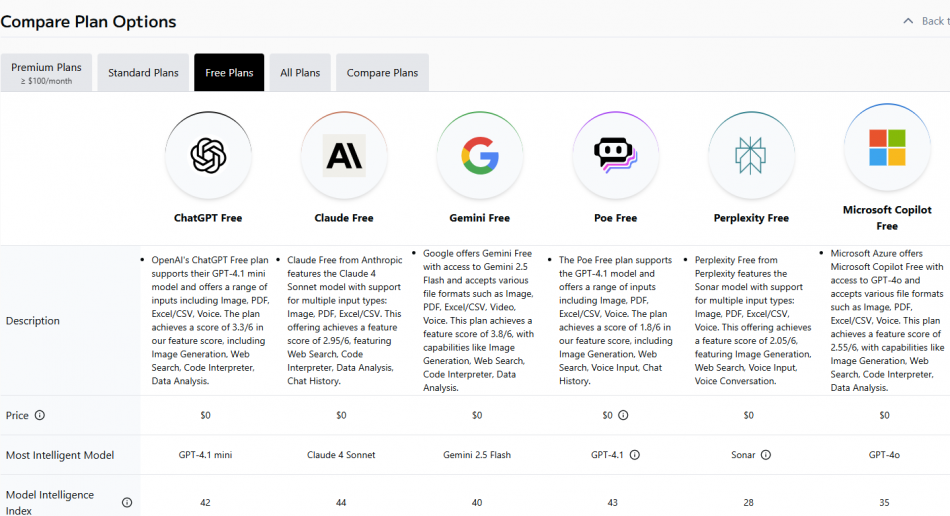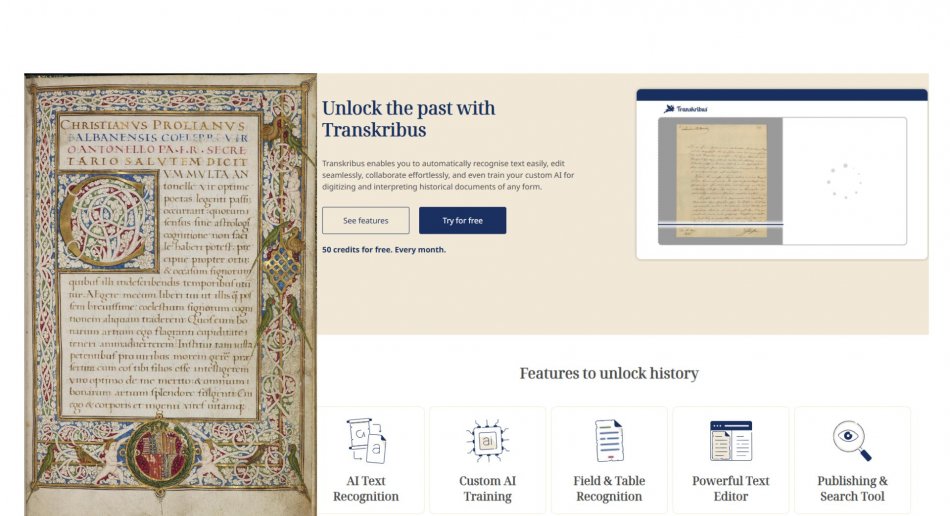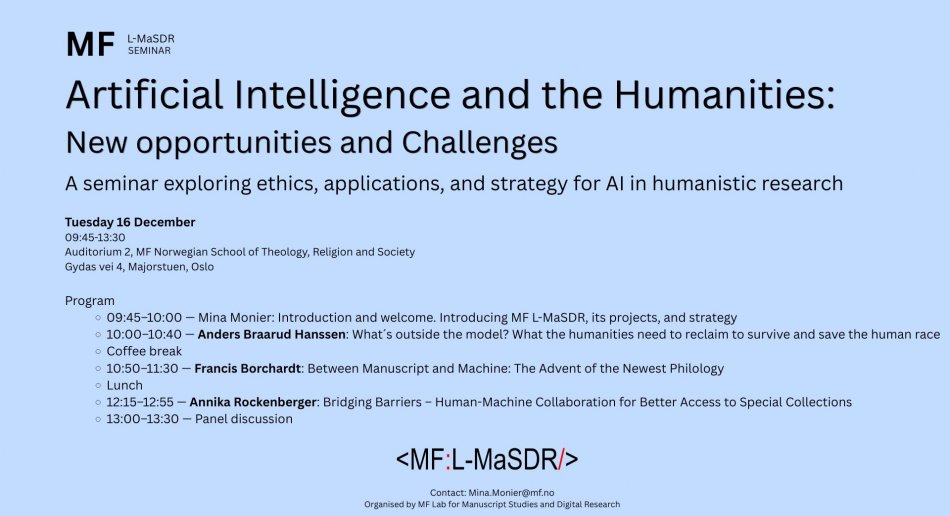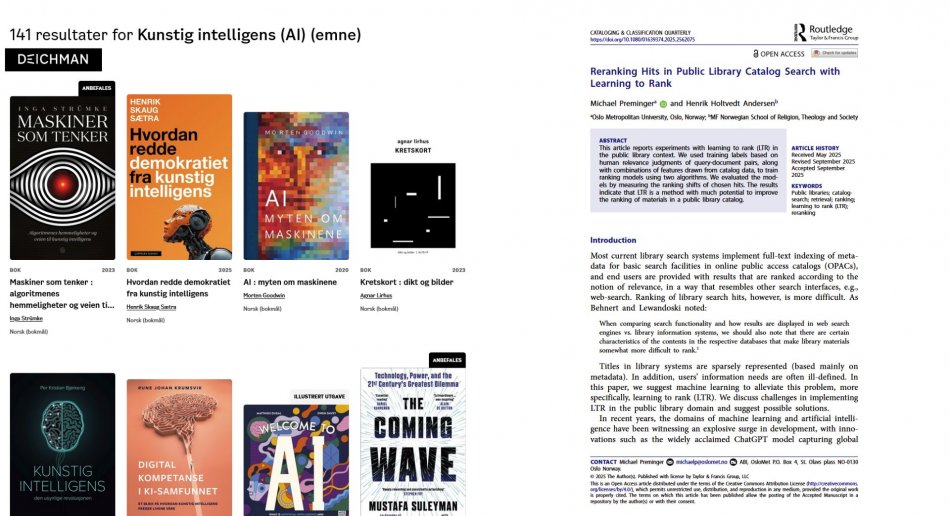
Which Free AI Chatbot is Best for the Humanities?
This post examines Claude (Free) and how it compares to ChatGPT and Gemini, to evaluate which AI chatbot serves humanities research best - focusing on reasoning, multilingual ability, accuracy, privacy, and practical usability.
Important: do not share personal data, direct or indirect, or other data classified as yellow, red or black, with the AI Chatbots mentioned in this post.
General Criteria for Evaluating AI Models
Overall intelligence/benchmark performance
Leaderboards such as Artificial Analysis show that the model used in Claude Free (Sonnet 4) is more intelligent than the model mostly used in ChatGPT Free (GPT 4.1 mini) and Gemeni’s 2.5 Flash.
However, Claude Pro does not outperform the newest GPT-5.1 or Gemini Ultra models. Moreover, in ChatGPT Free and Gemeni you do get a small quota of about 5-10 prompts of their pro/pay models, which in practice raises the quality of their free models.
Functionality and tooling
File uploads, image analysis, browsing, and document handling vary across platforms. Claude Free supports long PDF reading but offers fewer tools than ChatGPT Free, Gemini, or Copilot, which integrate more deeply with their respective ecosystems.
Capacity and usage limits
Claude Free has a strict session quota, reported to be reached in 20-40 messages. While testing, I rather quickly reached my session limit and needed to pause for 5 hours, and this is a major drawback. By contrast, ChatGPT Free (GPT-4.1 mini) and Gemeni's Flash 2.5 allows a significantly higher number of interactions; it is virtually unlimited. For deep research prompts, the quota is also smaller with Claude (3) compared to ChatGPT (5) and Gemeni (5).
Memory and continuity
All models have memory, but ChatGPT and Gemeni currently offer a more advanced persistent memory system, allowing it to remember user preferences, writing style, and ongoing projects across sessions. Claude’s memory is more limited to each single chat session.
What to look for in a “humanities-model”
Interpretive, Creative, and Long-Context Reasoning
Claude performs exceptionally well here. According to the blog Tom's Guide Claude “excelled in creativity, style-shifting and critical thinking” and was noted for “reflective and balanced responses”. Claude by default replies in a more formal and academic tone, rather than ChatGPT’s chattier style. Claude also scores highly in benchmarking of reasoning and long-context capability, excelling in processing long documents like books and dissertations, more so than any other model. This makes it particularly strong for literary analysis of long documents, philosophical discussion, and religious studies.
Source transparency & accuracy
Humanities work requires clarity about uncertainty, careful citation, and avoidance of hallucinated sources.
Claude is generally strong in transparency and accuracy but has some weaknesses. It offers web search and can cite its claims in-text, although the quality of the citations is not as good as with ChatGPT and especially Gemeni which is deeply integrated with Google Search. For instance, in a reply explaining its model sonnet 4.5, it cited a completely non-relevant news article about the death of the pope. Because Claude Free has limited browsing, it may rely more on training data rather than live sources, which can reduce accuracy for factual questions. For instance, when asked “who is the current pope?” Claude answered Pope Francis, which is no longer correct. For pure factual retrieval, models like Gemini (Google) or Copilot (Microsoft) typically perform better.
Multilingual and cross-cultural reach
Humanities research often involves less-resourced languages (e.g., Syriac), classical languages (Latin, Greek), and culturally complex texts.
According to the HuggingFace AI Language Benchmarks, Claude models currently occupy the top positions for multilingual performance overall, outperforming GPT-5, GPT-4o, and Gemini 2.5 Pro.
Latin is included in this benchmark, where Claude ranks near the top, above ChatGPT and Gemini. This suggests that Claude is especially strong for broad multilingual tasks. Claude’s cultural sensitivity is also notably strong compared to competitors, and its training emphasizes ethical and contextual care.
Data privacy & ethical alignment
Humanities scholars frequently work with sensitive material like interviews, manuscripts, or anonymized field notes. A good model must respect user confidentiality and not store or reuse content.
Here, Claude is one of the strongest options. Acording to Anthropics privacy policy, it trains models not to store user data, and conversations are not used to train future models. Its safety architecture is also more conservative, reducing risks with sensitive materials.
Conclusion
Overall, Claude stands out as a highly capable model for humanities research, thanks to its strong interpretive abilities, multilingual reach, and careful ethical design. Its strengths in handling long, complex texts and providing nuanced, context-aware analysis make it particularly well suited for scholars in humanities. However, its practical limitations, especially the strict usage quotas and somewhat weaker factual retrieval, makes ChatGPT and Gemeni, in my opinion, more solid and convenient choices. The constraints in capacity are largely avoided with Claude Pro (pay version). Using the pay version of AI chatbots is generally recomended, as they offer more intelligent models, more features and fewer limitations.
Claude AI remains an excellent option for humanities-focused tasks, and a tip is to switch between Free AI Chatbots depending on the task at hand, and when your usage quota is reached.
AI Use Declaration:
Draft text was generated with assistance from ChatGPT (GPT 5.1) and Claude (Sonnet 4) using internet-linked sources I provided. Their output was then substantially edited, fact-checked, and supplemented by me before producing the final version.
Sources
AI Chatbots Comparison: ChatGPT, Claude, Meta AI, Gemini and more. (u.å.). Hentet 14. november 2025, fra https://artificialanalysis.ai/insights/chatbots-comparison
Claude. (2025, juli 20). PCMag UK. https://uk.pcmag.com/ai/158931/claude
Claude 3.5 Sonnet vs GPT-4o. (u.å.). Hentet 14. november 2025, fra https://www.vellum.ai/blog/claude-3-5-sonnet-vs-gpt4o
languagebench—A Hugging Face Space by fair-forward. (u.å.). Hentet 13. november 2025, fra https://huggingface.co/spaces/fair-forward/languagebench
published, A. C. (2025, september 21). I tested Claude, Gemini and Grok with 7 real world prompts—Here’s which AI beat the others. Tom’s Guide. https://www.tomsguide.com/ai/i-tested-claude-gemini-and-grok-with-7-real-world-prompts-heres-which-ai-beat-the-others
Privacy Policy. (u.å.). Hentet 13. november 2025, fra https://www.anthropic.com/legal/privacy
The Best AI Chatbots for 2025. (2025, oktober 27). PCMag UK. https://uk.pcmag.com/ai/148205/the-best-ai-chatbots-for-2023
updated, A. H. last. (2025, september 18). I’m planning on switching to Gemini after using ChatGPT as my daily chatbot for years—Here’s why. Tom’s Guide. https://www.tomsguide.com/ai/chatgpt-has-been-my-daily-chatbot-for-years-heres-why-im-planning-on-switching-to-gemini



